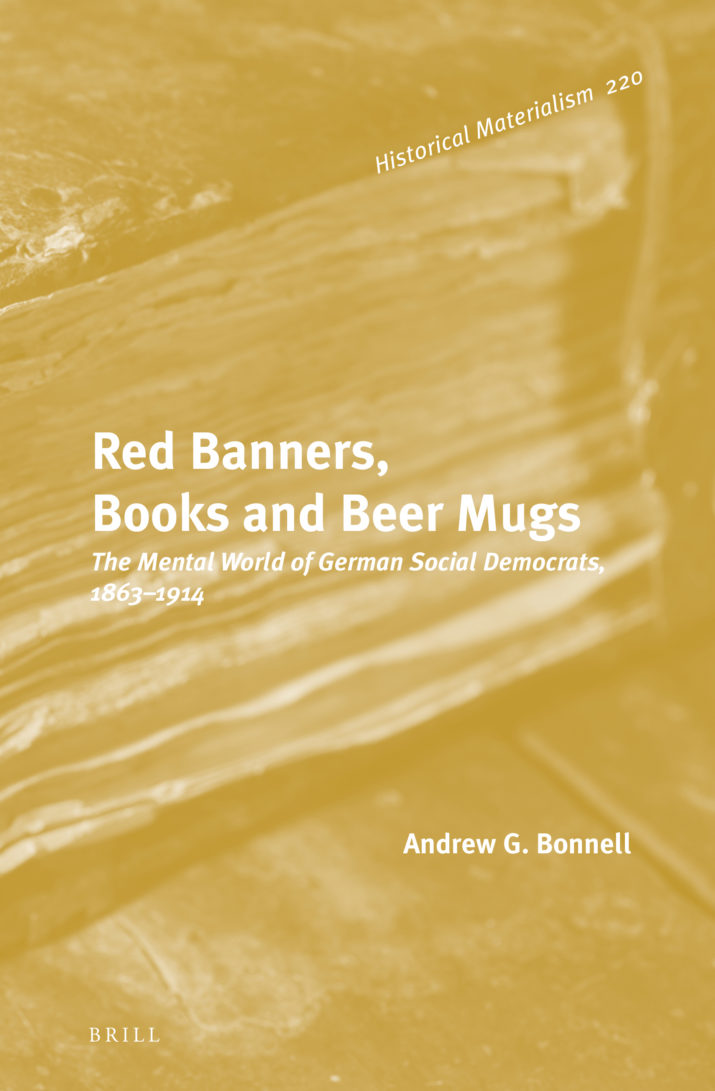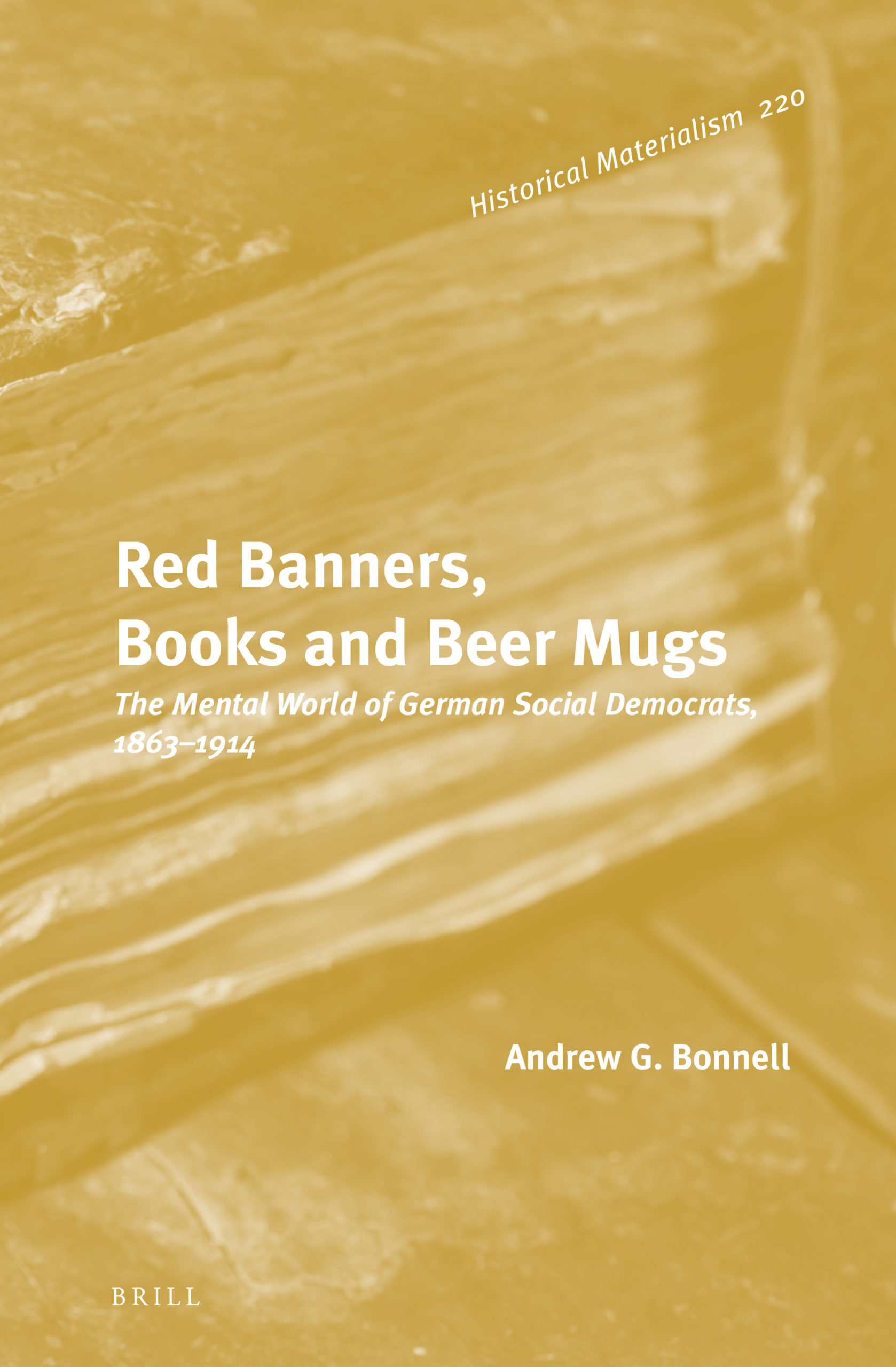
Red Banners, Books and Beer Mugs: The Mental World of German Social Democrats, 1863-1914 by Andrew G. Bonnell

Who was the most important German left-wing activist of the nineteenth century? Readers of Jacobin and the Wall Street Journal could easily give you the same answer: Karl Marx. However, if we could ask a nineteenth-century German worker the same question, we would get a different answer: Ferdinand Lassalle. The son of a well-to-do Jewish silk merchant, Lassalle attended university, joined a bourgeois student fraternity, famously represented a countess as an attorney, and cultivated a penchant for dueling. He was an unlikely social democratic hero. However, while Marx and Engels set up shop in England to churn out theoretical treatises, Lassalle mobilized the German working class on the ground with his fiery rhetoric. He founded the General German Workers’ Association in 1863 and then led this first German socialist party for 15 months before he was killed in a duel. A posthumous cult developed as soon as Lassalle’s embalmed body traveled around Germany before his burial, and working-class veneration of Lassalle continued into the early twentieth century. Throughout this time, German workers and their families flocked to Lassalle festivals, listened to poems and songs honoring the martyr, and bought mass-produced photos that ended up in working-class homes. When anti-socialist legislation suppressed socialist activities, the trade in mementos honoring Ferdinand Lassalle was driven underground. Prussian authorities even tracked an illicit shipment of Lassalle busts and convicted a Berlin carpenter for selling contraband Lassalle images. When the anti-socialist legislation finally lapsed in 1890, German shopkeepers telegraphed their political sympathies by prominently displaying images of Ferdinand Lassalle in their shop windows.
Andrew Bonnell’s scholarly study of the milieu and mentalité of nineteenth-century German social democrats is replete with well-crafted reconstructions of this lost working-class culture. This was a world in which Lassalle outshone Marx and trading pictures of the murdered dueler was worth jail time. In Red Banners, Books and Beer Mugs: The Mental World of German Social Democrats, 1863-1914, Bonnell paints a captivating picture of a typical Wilhelmine socialist family. Through reading this book, we can envision a working-class family in which young boys were trained as skilled craftsmen—perhaps lathe operators or wood turners—to be the backbone of the German socialist movement. This hypothetical family got their news by exchanging their illustrated socialist satirical magazine Der wahre Jacob for a hand-me-down copy of the socialist newspaper Vorwärts from the local boardinghouse. Women in the family shared news items they read in the women’s magazine Die Gleichheit while complaining about higher bread prices waiting in a shop line. Tired workers gathered in the evenings at a local pub. The socialist pub owner/party functionary never stocked schnapps produced by German aristocrats and instead served beer produced by unionized brewery employees. Nightly conversation in the pub might have turned from rising prices of horse meat to the latest foreign jaunt of a Hohenzollern prince. When not riding with socialist cycling club or sending off the kids to the socialist youth group, the whole family might spend their one day of rest—Sunday—at a social democratic festival listening to speeches, singing songs, and enjoying an evening puppet show or tableau vivant, followed by a raucous evening of dancing. Reading the “history of the working class” conjures up images of slogging through monographs recounting strikes, party executive meetings, and the intricacies of Marxist theory, so Bonnell’s reconstruction of Wilhelmine socialist culture is most welcome. His chapters are self-contained and thematic, so one could envision assigning the chapter on social democracy and the price of bread in an advanced college seminar, and any industrious graduate student working on the nineteenth century history of the German left would be well advised to pore over the footnotes and extensive bibliography.
Although Bonnell does not take a chronological approach to this history, he does point towards the earliest years of German social democracy when two competing socialist associations formed with differing stances on ideology, Prussia, and war. From this early heterogeneity, Bonnell moves toward a homogenizing socialist culture that forged a strong sense of class consciousness under the banner of one, united socialist party. However, the rich details of the Wilhelmine working-class experience are the red threads that tie together all the book’s chapters. Bonnell has combed through police reports surveilling socialist activities from archives across Germany and in modern-day Poland to reconstruct brief glimpses of socialist workers and their families going about their everyday lives. He has supplemented these archival materials with memoirs both from leading socialists and from ordinary workers. Furthermore, Bonnell marshals evidence from pamphlets, tracts, and the socialist press from across the empire with aplomb.
Although Bonnell explores popular understandings of Marxist ideology, he rightly points out that nineteenth-century German social democratic success in mobilizing its base paired “addressing real problems in the present […] with a promise of radical change in the future” (7). That said, one occasionally gets the sense that Bonnell wishes that nineteenth-century socialists had done a bit more theorizing, especially about what a post-imperial Germany would look like: “The failure to theorise what a social democratic republic might involve […] was one of the several handicaps with which Social Democrats had to cope when Friedrich Ebert took over the receivership of the bankrupt Empire at the end of 1918” (195). In November 1918, power was foisted into the hands of Friedrich Ebert and a few comrades. When Ebert—a trained saddle-maker, who had lost two of his sons in war—took over the ship of state, those pesky “real problems in the present” seemed slightly more pressing. Ebert needed to end a world war, provide food and necessities to a defeated nation, deal with swastika-bedecked paramilitaries wandering the streets of Berlin, and defeat anti-republican coup attempts from all sides. No amount of socialist theorizing could have lifted him immediately out of that quagmire.
If there is a cost to this rich detail about working-class life in Germany, it is that Bonnell only infrequently peers beyond Germany’s borders or towards the potent ideologies that marked Germany’s future. He explicitly excludes the transnational ties of socialists, although the reader misses out on a whole world of working-class women advocating internationally for equal suffrage rights, union activists gathering with their European colleagues, and German socialist speakers traveling abroad to gin up support for social democracy across the continent. Bonnell fleetingly mentions excitement among ordinary German workers at news of foreign revolutions or strikes, but the borders of Imperial Germany tend to limit Bonnell’s history. However, there are flickers of how overseas imperialism was received among the working class. A fastidious Hamburg police officer recorded that socialist pubgoers expressed sympathy for the Chinese murderers of a German foreign envoy, and Berlin’s police noted anti-imperialist plays at socialist festivals in 1909. Still, the 1907 German election in which jingoistic fervor over colonial conflict dealt a devastating electoral blow to the social democrats is incongruously squeezed into a chapter on bread prices. Historians now think of this election in the context of the genocide Germans were perpetrating against the Herero and Nama peoples. Bonnell’s chosen context of tariff policy and food prices seems odd. Similarly, there are only isolated glimmers of German nationalism in the form of anti-Polish sentiment from Hamburg’s working-class pubgoers, and antisemitism is mentioned only once, as a conservative insult lobbed at socialists. This is a period when antisemites were organizing politically and antisemitic blood libel cases in Bohemia and Prussia were all over the news—including in the German socialist press. Adding a chapter that brought together and contextualized Bonnell’s references to working-class anti-imperialism, as well as dredging up more material on nationalism and antisemitism, would have provided more overlap with recent scholarly concerns and peered both beyond the imperial borders and towards Germany’s tragic future.
Although Andrew Bonnell has given us a rich new perspective on the lives, ideas, and culture of working-class Germans who lived in the late nineteenth century, he frames his book with a lamentation. On the first page, he expresses regret that “academic fashion has drifted away from labour history” (1). The reasons for this are complex. Historians wear the rose-colored glasses of the present, so after the Soviet Union collapsed and as trade union influence ebbed during recent decades, the antecedent history of working-class activism seemed less salient. Most recent textbooks that consider Germany’s nineteenth century treat the “history of German workers and the labour movement as more marginal than might have been the case in the 1980s,” but those same textbooks instead consider new histories we are crafting. They might touch on the global history of capitalism, the history of race and hygiene, and the history of humans and the environment. However, Red Banners, Book and Beer Mugs reminds us of what we have lost as these historical fads have changed. In an era of fracturing societies and elite skepticism of ordinary people, Bonnell’s history points to the possibility of solidarity, intelligence, and strength among ordinary workers. When the scholarly winds change and labor history again becomes popular, Bonnell’s expert study will be waiting for a future graduate student to pick up as they embark on their own path-breaking study of Europe’s working class and its past.
James McSpadden is an Assistant Professor of History at the University of Nevada, Reno. He is currently working on a book exploring behind-the-scenes political cooperation in interwar Europe.
Red Banners, Books and Beer Mugs: The Mental World of German Social Democrats, 1863-1914
By Andrew G. Bonnell
Publisher: Brill
Hardcover / 225 pages / 2020
ISBN: 9789004300620




